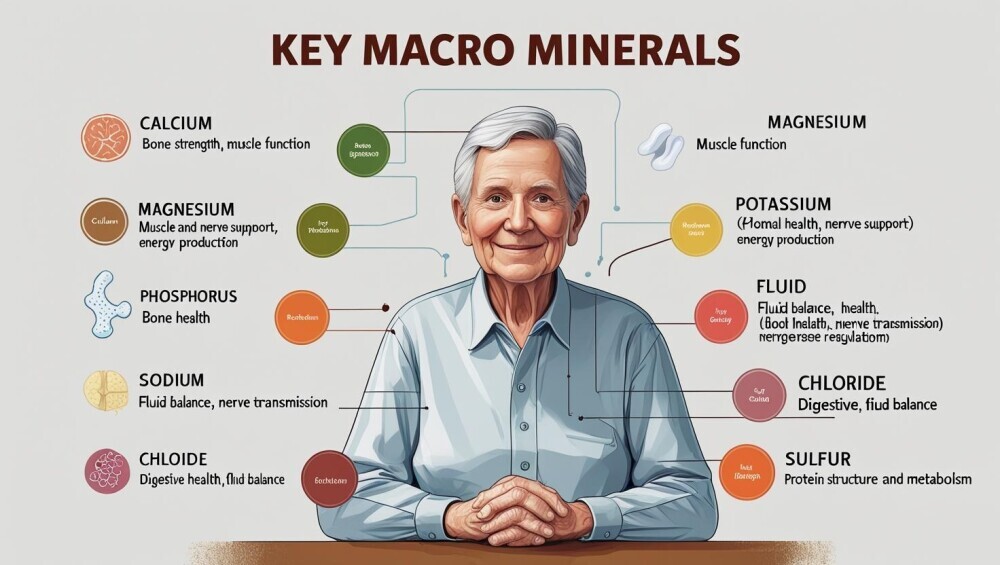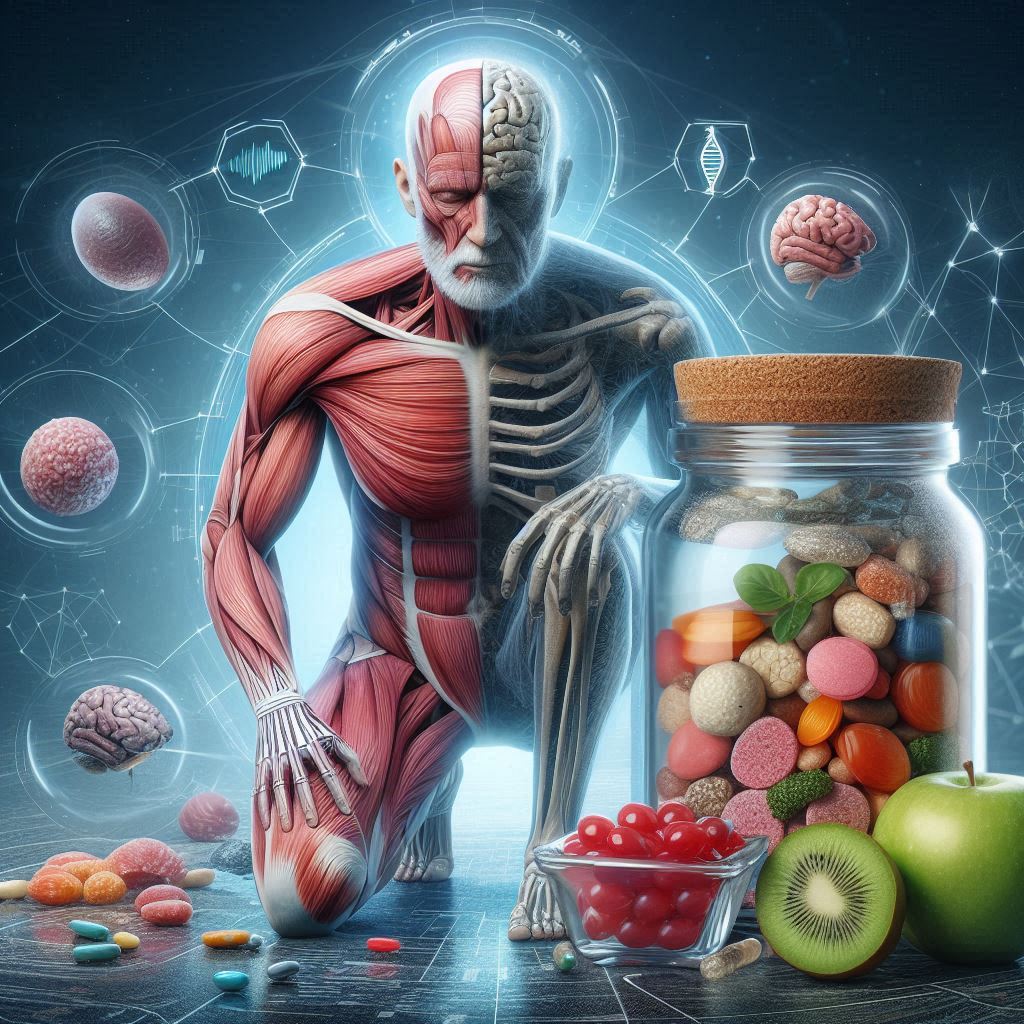As we age, our bodies change and so do our nutritional needs. Mineral supplements can play a vital role in supporting health and vitality in seniors. Whether it’s maintaining bone strength, boosting energy levels, or supporting the immune system, understanding how minerals work can help older adults stay healthier and longer.
Mineral supplements are products designed to add essential minerals to our diet. They come in various forms (tablets, capsules, powders, and liquids) and are aimed at filling nutritional gaps and supporting overall well being.
In today’s fast-paced world, many people rely on convenience foods or have busy schedules that limit healthy meal preparations. As a result, mineral supplements can help make up for what’s missing in the diet. Growing awareness about nutrition and preventative health has also led to a rise in supplement use.
Vitamins vs. Minerals: What’s the Difference?
Vitamins and minerals, while essential, serve different roles. Vitamins are organic and can be broken down by heat, air, or acid, whereas minerals are inorganic. This means minerals hold onto their chemical structure. They are crucial for building strong bones, transmitting nerve impulses, and maintaining a normal heart rhythm.
Vitamins are organic compounds that can be broken down by heat, air, or acid.
Minerals are inorganic elements that retain their structure and are crucial for many bodily processes.
When we talk about minerals in vitamins, it’s about how they work in tandem within the body. For example, calcium, a mineral, is often grouped with vitamin D because they pair together to strengthen bones.
Keeping a balanced intake is key. Minerals perform numerous roles from regulating blood pressure to supporting the production of hormones. Ensuring your body gets enough of these nutrients isn’t just about eating well, but about being mindful of how each component interacts within your diet.
How Minerals Support the Body
Minerals are fundamental to many bodily functions. Every decision our body makes, from building bone structure to producing energy, involves minerals. They assist in the maintenance of nerve function, and they play a huge role in muscle health and the body’s ability to absorb other nutrients.
Key minerals like calcium and magnesium are essential for skeletal health, while iron is critical for blood production. Zinc supports immune function, helping to stave off illnesses and infections. These functions highlight the importance of ensuring our body receives adequate minerals.
The seven most crucial minerals, often referred to as macro-minerals, include calcium, phosphorus, magnesium, sodium, potassium, chloride, and sulfur. These are needed in substantial amounts to keep the body’s systems running smoothly.
Key Macro-Minerals
These are needed in larger amounts:
Calcium – Bone strength, muscle function
Magnesium – Muscle and nerve support, energy production
Potassium – Blood pressure regulation
Phosphorus – Bone health, energy metabolism
Sodium – Fluid balance, nerve transmission
Chloride – Digestive health, fluid balance
Sulfur – Protein structure and metabolism

Important Trace Minerals
Needed in smaller amounts but still critical:
Iron – Oxygen transport, energy
Zinc – Immune function, wound healing
Selenium – Antioxidant protection, thyroid health
Iodine – Thyroid hormone production
Copper, Chromium, Manganese – Enzyme function and metabolism
Understanding the role of each mineral can guide dietary choices and supplementation. Ensuring a diet rich in diverse nutrients or seeking advice on the right supplements can be beneficial in maintaining optimal health.
The Potential Benefits and Risks of Mineral Supplements
Mineral supplements can provide significant benefits when dietary intake falls short. They are particularly helpful for people with specific health conditions or dietary restrictions. For those struggling to eat a diverse diet, maybe due to lifestyle or budget constraints, these supplements can be a practical solution to meeting nutritional needs.
However, it is important to approach supplementation with caution. While deficiencies may prompt supplementation, over supplementation carries its own risks, such as toxicity or imbalances that could affect your health negatively. Symptoms of taking too much of a particular mineral can vary but might include nausea, diarrhea, or even kidney damage in severe cases.
Before jumping into a supplementation routine, it is always wise to get a professional opinion. A healthcare provider or your doctor can guide you based on specific nutritional deficiencies or health goals, ensuring that the supplement aligns with your individual needs.
Proactive health monitoring, such as regular blood tests, can identify mineral deficiencies and help adjust your intake. This translates into more effective and safer consumption of supplements, tailored to what your body truly requires.
Mineral Requirements for the Elderly
As we age, our bodies undergo changes that can affect nutritional needs. The elderly often require particular attention to ensure they are getting enough of specific minerals that may be lacking due to dietary shifts or health conditions.
Calcium is crucial for maintaining bone density, a significant concern for older adults given the risk of osteoporosis. Pairing it with vitamin D can further enhance bone health by improving calcium absorption.
Potassium is another essential mineral, helping with blood pressure regulation, and it can be beneficial in keeping the heart healthy. Foods rich in potassium, like bananas and leafy greens, should remain a staple.
Iron and magnesium also hold importance. Iron combats fatigue by supporting oxygen transport in the bloodstream, while magnesium contributes to muscle and nerve function and helps with sleep quality, something that can often become problematic with age.
For energy boosts, B vitamins, especially B12, are vital. They play a role in converting food into energy and are crucial for maintaining nerve function. Since absorption of B12 can decrease with age, supplementation might be necessary.
By focusing on these key minerals and vitamins, seniors can maintain their vitality and overall health. However, it’s always a good idea to discuss any dietary changes or supplement additions with a healthcare provider to tailor the approach to individual health needs and conditions.

Who Needs Mineral Supplements and How to Choose the Right One
Not everyone requires mineral supplements, but they can be beneficial for certain groups. Individuals with specific dietary restrictions, such as vegans or those with food allergies, might find it challenging to meet their mineral needs through diet alone. Pregnant women and those with certain medical conditions may also require additional mineral intake.
When choosing a mineral supplement, it’s important to consider factors like individual health needs and dietary gaps. For example, those with anemia might benefit from iron supplements, while individuals with digestive issues may require additional zinc or magnesium.
Reading labels carefully is crucial. Opt for supplements that offer bioavailability, which means the body can absorb and utilize the minerals effectively. It’s also wise to check for third-party testing or certifications to ensure quality and purity.
Consulting a healthcare provider is essential before starting any supplement regimen. They can recommend testing for deficiencies and tailor advice based on personal health conditions or lifestyle factors, ensuring that you are taking the most appropriate supplement in safe dosages.
Understanding your unique dietary needs and consulting with a professional can assist in making an informed decision, optimizing health benefits while minimizing risks.
Common Mineral Deficiencies in Seniors
As people age, certain mineral deficiencies become more common due to factors like dietary changes and decreased absorption efficiency. Addressing these deficiencies is vital to maintaining health and well-being.
Calcium is a crucial mineral for bone health. As bone density tends to decrease with age, ensuring sufficient calcium intake can help prevent osteoporosis and fractures.
Magnesium supports muscle function and cardiovascular health. A deficiency might lead to muscle cramps or more serious complications like abnormal heart rhythms.
Potassium plays an essential role in regulating blood pressure. Low potassium levels might contribute to hypertension, increasing the risk of heart disease and strokes.
Iron is another important mineral, especially for preventing anemia, which is characterized by fatigue and weakness. Older adults need to maintain adequate iron levels to support oxygen transport in the blood.
Zinc is crucial for maintaining immune function and promoting wound healing. It’s important for seniors to get enough zinc to help ward off infections and speed up recovery from injuries.
Selenium and iodine are needed for healthy thyroid function and antioxidant defense. A balanced intake ensures proper metabolic regulation and helps protect against cellular damage in the elderly.
Being proactive about addressing these common deficiencies involves monitoring dietary intake and considering supplements when necessary. Consulting healthcare providers can guide you through these options, ensuring nutritional goals are met effectively.
Sources of Minerals
A balanced diet is the best way to ensure adequate mineral intake.

Many fruits, vegetables, dairy products, whole grains, and lean meats are rich in essential minerals. Natural sources like leafy greens, nuts, and seeds provide key nutrients that support overall health.
Fortified foods can also contribute to mineral intake. Products like breakfast cereals or plant-based milks often have added minerals such as iron or calcium, catering to dietary needs or preferences.
Supplements should ideally serve as an adjunct to a mineral-rich diet, filling specific nutritional gaps identified through health consultations.
Before considering supplementation, it’s worthwhile to explore dietary adjustments that may cover mineral needs. Consulting with a nutritionist can help plan meals that maximize natural mineral intake while considering personal health factors.
When diet alone isn’t enough to meet the body’s mineral requirements, particularly in cases of diagnosed deficiencies, supplements become more relevant. However, it’s important to choose quality products and use them under professional guidance to avoid potential risks.
Balancing these sources helps ensure that you get the necessary minerals in a way that supports long-term health objectives. Emphasizing natural intake while considering supplements when truly necessary can provide the best nutritional outcomes.
Frequently Asked Questions
1. Why might seniors need mineral supplements?
As people age, they often experience dietary shifts and changes in absorption efficiency, leading to common deficiencies in minerals like calcium, magnesium, iron, and zinc. Mineral supplements can help support bone health, energy levels, immune function, and overall well-being when dietary intake falls short.
2. Are mineral supplements safe to take daily?
While mineral supplements can be beneficial, daily use should be based on individual needs and professional guidance. Over-supplementation can lead to adverse effects such as toxicity or nutrient imbalances. It’s best to consult a healthcare provider before starting a supplement regimen.
3. What should I look for when choosing a mineral supplement?
Choose supplements with high bioavailability (easily absorbed by the body), verified by third-party testing for quality and purity. Consider your personal health needs and dietary gaps, and consult with a healthcare provider to ensure you’re selecting the right supplement and dosage.


This post provides such a helpful breakdown of how mineral supplements can support health, especially as we age. It’s eye-opening to see how crucial minerals like calcium, magnesium, and iron are—not just for bones and energy, but even for things like sleep and immune function.
I’m curious, though: for those already eating a relatively balanced diet, how can you tell if supplementation is actually necessary? Are there any early signs of deficiency that people commonly overlook?
Also, when it comes to choosing supplements with better bioavailability, are there certain forms (like citrate vs. oxide) that are generally more effective or easier on digestion? Thanks for the detailed info—it’s got me thinking more critically about my own intake!
Thank you so much abby for your thoughtful comment and I am glad you found the article helpful!
You have raised two excellent questions that are important for anyone considering mineral supplementation, even those with a relatively good balanced diet.
1. How to Know If Supplementation Is Necessary:
Even if you have a good and nutritious diet, there are certain factors such as age related changes in food/nutrient absorption, medications, or chronic health conditions that can impact how well the body utilizes nutrients. Some early signs of mineral deficiencies are subtle and often overlooked. For example:
Magnesium deficiency may show up as muscle cramps, fatigue, or trouble sleeping.Iron deficiency can cause low energy, pale skin, or feeling cold more often than usual.Calcium deficiency may lead to brittle nails or muscle spasms.Zinc deficiency might manifest as slower wound healing or a weakened immune response.
Because these symptoms can overlap with other health issues, it’s best to confirm through routine blood tests. A healthcare provider can help identify specific deficiencies and recommend supplementation if needed.
2. Forms of Minerals and Bioavailability:
Yes, the form of a mineral supplement can significantly affect how well it is absorbed and how gentle it is on the digestive system. Here are a few commonly used forms with generally higher bioavailability:
Calcium citrate is more easily absorbed than calcium carbonate and is gentler on digestion, especially helpful for older adults or those with lower stomach acid.Magnesium glycinate or citrate is better absorbed and often preferred for those with sensitive stomachs. Magnesium oxide, while common, has lower absorption and may cause digestive upset.Iron bisglycinate is often well-tolerated and may cause fewer gastrointestinal side effects compared to ferrous sulfate.Zinc picolinate or citrate tends to have better absorption than zinc oxide.
Look for supplements that specify the form of the mineral and consider those that include chelated minerals, which are bound to amino acids to enhance absorption.
I appreciate thoughtful questions like yours. Being proactive and informed about nutritional choices is a great way to support long-term health!
This is a really informative guide—thank you for laying out the basics so clearly! I appreciated how you explained what mineral supplements are, why certain groups (like older adults) might benefit from them, and practical tips around choosing high-quality and absorbable forms. A few questions came to mind:
Based on your experience, which types of mineral forms—like chelated bisglycinate vs. simpler oxides—tend to be better absorbed and cause fewer digestive side effects? I’ve read mixed opinions, and would love your take on what’s best for daily use.
Do you think broad-spectrum multi-mineral supplements are preferable to targeting individual minerals separately? Are there risks of taking too many minerals at once or nutrient imbalances if someone isn’t deficient?
Your insight would be really helpful as I start to build a more personalized supplement routine. Thank you again for this thoughtful and well-researched post! ~Leahrae
Thank you so much for your kind words and comments, Leahrae!
I am really glad you found the article helpful and that it sparked some thoughtful questions—those are excellent ones, and they touch on some of the nuances that can make a big difference when building a supplement routine.
You sound like you have good knowledge in chemistry and as a scientist myself I will reply in a more tehnical manner:
1. Mineral Forms and Absorption:
You are absolutely right to be discerning about the form of minerals you take. Generally, chelated minerals, such as magnesium bisglycinate, zinc picolinate, or iron bisglycinate, tend to offer better absorption and are often gentler on the digestive system compared to inorganic forms like oxides or sulfates. For example, magnesium oxide, while common and inexpensive, has a relatively low absorption rate and is more likely to cause Gastrointestinal upset or loose stools. Chelated forms are bound to amino acids, which help them be absorbed more efficiently in the gut.
That said, individual tolerance can vary, and sometimes specific forms may be recommended based on a person’s health goals or conditions. For instance, magnesium citrate is often used for constipation, while bisglycinate is preferred for sleep or muscle support due to its calming effects.
2. Broad-Spectrum vs. Targeted Supplementation:
This really depends on your personal health status, dietary intake, and any known deficiencies. Broad-spectrum multi-mineral supplements can be a good starting point if you’re generally healthy but want to fill in small nutritional gaps, especially if your diet varies day to day. They can offer convenience and a balanced dose of several essential minerals.
However, the risk with multi-minerals comes when they contain high doses of minerals that you don’t need, or when they combine nutrients that may compete for absorption (like calcium, magnesium, zinc, and iron, which all use similar transport pathways). This can potentially reduce their effectiveness or even lead to nutrient imbalances over time.
If you know you’re deficient in a specific mineral, for example iron, magnesium, or zinc, it is often better to supplement that mineral individually, in a form and dosage tailored to your needs. Lab testing and consultation with a healthcare provider or nutritionist can really help determine this.
In short:
Chelated forms = generally better tolerated and absorbed.Broad-spectrum supplements = helpful for mild, general support.Targeted supplementation = best when guided by labs or clear symptoms.
I hope this helps you as you refine your supplement routine!
Warmly,
Saschi